The FTX collapse and scandal continue to unfold in the media. As a tech investor and advisor, I can’t help being more than a little furious with the investors who backed it so consistently over years with $ 1.8 billion in total capital raised. Many of these are regulated entities; others invest public money or pension fund assets. Their apparent failure to insist on real transparency and better governance is almost certainly an enabling factor in how FTX was managed. And therefore, their failure is arguably a factor in FTX’s collapse.
Let’s start by looking at what FTX was before its bankruptcy announcement. FTX was a crypto exchange. This means that buyers and sellers were able to create and fund their accounts, and then buy or sell cryptocurrencies or crypto derivatives. An exchange does not trade its own money: an exchange allows clients to conduct trades. The income of an exchange typically comes from trading fees: from the “flow” of buy/sell customer trades occurring where each trade incurs a transaction fee.
According to Business of Apps, on 6 September 2022:
1. FTX made $1.02 billion revenue in 2021 compared to $85 million in 2020;
2. It had over one million users on its mobile and desktop platforms;
3. Peak 24-hour trading volume has reached $21 billion in 2021; 4. Annual trading volume of crypto reached $385 billion in 2020.
FTX was valued at $32 billion in January 2022 and has now collapsed because of a liquidity shortfall that was exacerbated by reputational damage. As doubts have grown about FTX’s ability to withdraw their own funds from the exchange, this created a “run” which eventually forced FTX to stop withdrawals and seek external investors to recapitalise the company.
This run was apparently exacerbated in the last days by a theft of crypto and cash reserves that many investors had on their accounts.
Now in receivership, FTX is a private company, operating in and regulated by the Bahamas. Although it complied with certain aspects of international regulation -- for example, it had a European MIDIF II brokerage license issued in Cyprus by CySEC -- it is arguably not a fully-regulated company. Why?
a. Because unlike a fully-licensed brokerage regulated by FINRA, the US Financial Industry Regulatory Authority, there was apparently no oversight on any of the critical elements of brokerage operations, notably the necessity to maintain segregated accounts for customer capital and to comply with detailed reporting requirements.
b. Because it is obvious that if the company does not publish fullyaudited accounts, including cash positions and banking operations, there is no way a regulator or any external authority will be able to form a strong opinion on whether the company is solvent and in compliance or not.
Any potential investor or brokerage user can spot this immediately from the non-existent financial information published on the FTX website.
On the occasions when I teach young founders, I tell them there are two types of investors: smart capital and stupid capital.
Smart capital usually means institutional investors with an investment thesis; a comprehensive due diligence process which challenges the founder team; an investment committee (decisions made by more than one person); participation in governance post-investment (usually through Board seats and sometimes insistence on nominating the CFO; and insistence on professional governance. I typically include most Sand Hill Road VC firms in this category: companies with multiple partners, investing a mix of own and client assets, with deep experience in the tech sector.
Stupid capital, in contrast, usually means decisions taken on the spur of the moment based on personal chemistry or attraction to a charismatic founder; few term sheet requirements on reporting or governance; decisions made by a single investor; little or no due diligence (or simple acceptance of documentation). Investment decisions are typically made due to Fear of Missing Out (FOMO) or due to falling victim to a “reality distortion field” such as that emitted by Steve Jobs, Adam Neumann or, apparently, Sam Bankman-Fried.
So, I was furious over the past three days when I learned that:
1. FTX had a 3-person Board: two company founders and their Bahamas lawyer. There are no Board committees one would expect: Audit, Compensation, Nomination. Not a single external investor had a seat at the board. There were no skeptical eyes looking at strategy, decisions or financial reports.
2. The company had an openlyexpressed relationship with Alameda Research, a crypto broker, essentially owned and operated by the same team that ran FTX. This is an obvious conflict of interest.
3. As we move forward, I am sure we will see additional conflicts of interest featuring FTX / Alameda investments in a number of other coins or related partners. This is a result of strategic decisions made. Formally, 130 related entities filed for bankruptcy alongside FTX.
4. The FTT token, which essentially held no value but a trading discount on FTX, reached a market cap of over $ 6 billion, and apparently was accepted by investors (and regulators) as a real asset.
5. The Financial Times reported that one of the largest liquid assets on FTX’s balance sheet was “Serum”, a cryptocurrency with a listed $ 2.2 billion in value. According to the FT, the same day valuation of Serum was $88 million. This is a massive failure of mark-to-market asset valuation which calls into question what else FTX was over-valuing on its asset register.
6. FTX is registered in The Bahamas, and despite having received $1.8 billion from VCs and Institutional Investors, did not publish audited financial accounts. This is despite being a brokerage with millions of customer accounts and billions in daily transactions. On one occasion where a GAAP audit was passed (in 2001), the company did not publish it, but tweeted about its existence.
7. FTX somehow transferred $ 10 billion in client assets to Alameda Research, where Alameda presumably lost them in trading. How is this possible? Client assets are supposed to be in one or more segregated accounts, precisely so that in the case the broker or fund manager collapses, client money is safe. How is it possible that both the auditor as well as investors missed such a movement of cash?
According to Dealroom, FTX has raised $ 1.8 billion in funding in one Seed Round and 4 major funding rounds between 2019 and 2022. The list of institutional investors on board includes some of the most hallowed names in finance, including BlackRock, Binance, Greylock Partners, Lightspeed Venture Partners, the Ontario Teachers Pension Plan, Sequoia Capital, Softbank, Temasek and Tiger Global Management.
Some of these—Sequoia, BlackRock, Softbank—represent some of the leading tech investors in the world. Others, like Temasek, represent sovereign wealth funds with a high duty of accountability and transparency. None of these should be characterised as Stupid Capital. Yet that is exactly how they behaved:
• Why didn’t they demand basic corporate governance at FTX?
• Why didn’t they demand audited accounts?
• Why were investors not represented on the Board of Directors?
• Why didn’t they flag potential arms-length transaction issues between FTX, Alameda and others?
• Why did no one ask for a funds or liquidity statement? Did no one check the bank accounts? (This was the same oversight that Wirecard was able to use to commit financial fraud for years).
And this brings me to the final issue of regulation, particularly as it affects Cyprus. Cyprus has the oft-repeated ambition to become a global financial hub. Cyprus has also recently passed regulations on cryptocurrency and aims to begin attracting investment in this area as well. All investment-related companies in Cyprus are regulated by CySEC, the Cyprus Securities and Exchange Commission, taking into account all relevant European directives and regulations.
The following are a list of questions I have that are relating to the ability of Cypriot and European regulators to effectively regulate high dealflow companies in advance of a potential disaster, and not after the fact:
1. In the case of FTX, under what grounds was the license approved given that the parent company publishes no annual accounts and has a clearly-compromised Board of Directors?
2. In the case of FTX, how did regulators evaluate the financial liabilities and strength of the company, given that FTX is issuing a token called FTT that is essentially a trading discount on FTX? Did they give their own valuation to the token?
3. What is the risk analysis process that the regulators use to identify high(er) risk companies? How does this translate into enhanced surveillance and reporting requirements?
4. Which regulatory staff have enough primary work experience in managing or operating high deal flow trading companies that include millions of transactions per day as well as the use of derivatives, algorithmic trading, and global currency trading?
5. Which regulatory staff have enough experience in forensic auditing and the analysis of complex trading systems and software?
6. What real-time statistical and financial sampling, analysis and reporting systems does the regulator use (besides self-declarations on paper reporting forms) to determine whether a company has an opaque relationship with a related trading party? Or is exhibiting a pattern of unusual trading activity?
7. What cross-checking method does the regulator employ to make sure that regulated investment firms are indeed using segregated accounts and are not mis-using customer funds to trade on their own behalf?
8. What methods is the regulator using to control leverage offered to retail clients at forex and general trading brokerages?
9. Of the consumer complaints or questions submitted on the the regulator’s website, how many are actually answered and acted upon?
I am afraid there are rather predictable answers to these questions.
So the question any investor must ask themselves is: given the total absence of either real regulation or real financial disclosure from so many opaque crypto projects in the world today, what real guarantees do we have that this is not a scam?
The answer is also predictable: there are none.
Philip Ammerman Investment
Advisor & Angel Investor
Navigator Consulting & Innovation Partners Ltd.
pga@navigator-consulting.com
List of Sources
Bloomberg. 11 November 2022. FTX Meltdown Mystery Centers on a Financial Reporting Black Hole.
Business of Apps. 6 September 2022. FTX Revenue and Usage Statistics (2022).
DealRoom. Undated. FTX Listing.
Financial Times. 12 November. FTX held less than $1bn in liquid assets against $9bn in liabilities.
Reuters. 12 November 2022. Further details emerge on FTX bankruptcy and missing funds.
EY Cyprus Attractiveness Survey 2022 shows that Cyprus needs more investment in infrastructure projects, skilling and re-skilling of the local workforce and introducing new regulations to keep pace of developments. Technology, sustainability and talent remain high on the investors’ agenda.
Planned investments in Cyprus (29%) for the next year, although higher than in our previous survey of 2020, still remain well below the European average (53%). In contrast, attractiveness projections for the next three years remain optimistic and closer to the European average.
Cyprus would primarily be considered by investors for supply chain and logistics operations (35%), followed by sales and marketing offices and activities (24%), and headquartering (14%). It is also the first time the FDI intent includes manufacturing activity (7%).
Investors consider telecommunication and digital infrastructure, offering a good quality of life, and favorable corporate taxation as the most attractive criteria to invest in Cyprus. Investor responses reflect that Cyprus could do better in creating a more entrepreneurial, less bureaucratic and less administrative culture, and be more supportive of startups, the high-technology industry and SMEs. Investors’ perception is that Cyprus should concentrate its efforts on providing the means for regulation to keep pace with technological and other developments, to continue investing in major infrastructure projects, and that Cyprus needs to do more to advance education, skilling and reskilling, and facilitate access to talent.
Research & development investments
R&D activity in Cyprus, in 2020, was estimated at around 0.82%25 of the country’s GDP, with only 0.5% of the active population engaged in R&D activities. Cyprus’ R&D-related GDP share continues to be considerably lower than its European counterparts (EU average of 2.2%).
R&D investments by sector (2019)

Does your company have plans to establish or expand operations in Cyprus over the next year?
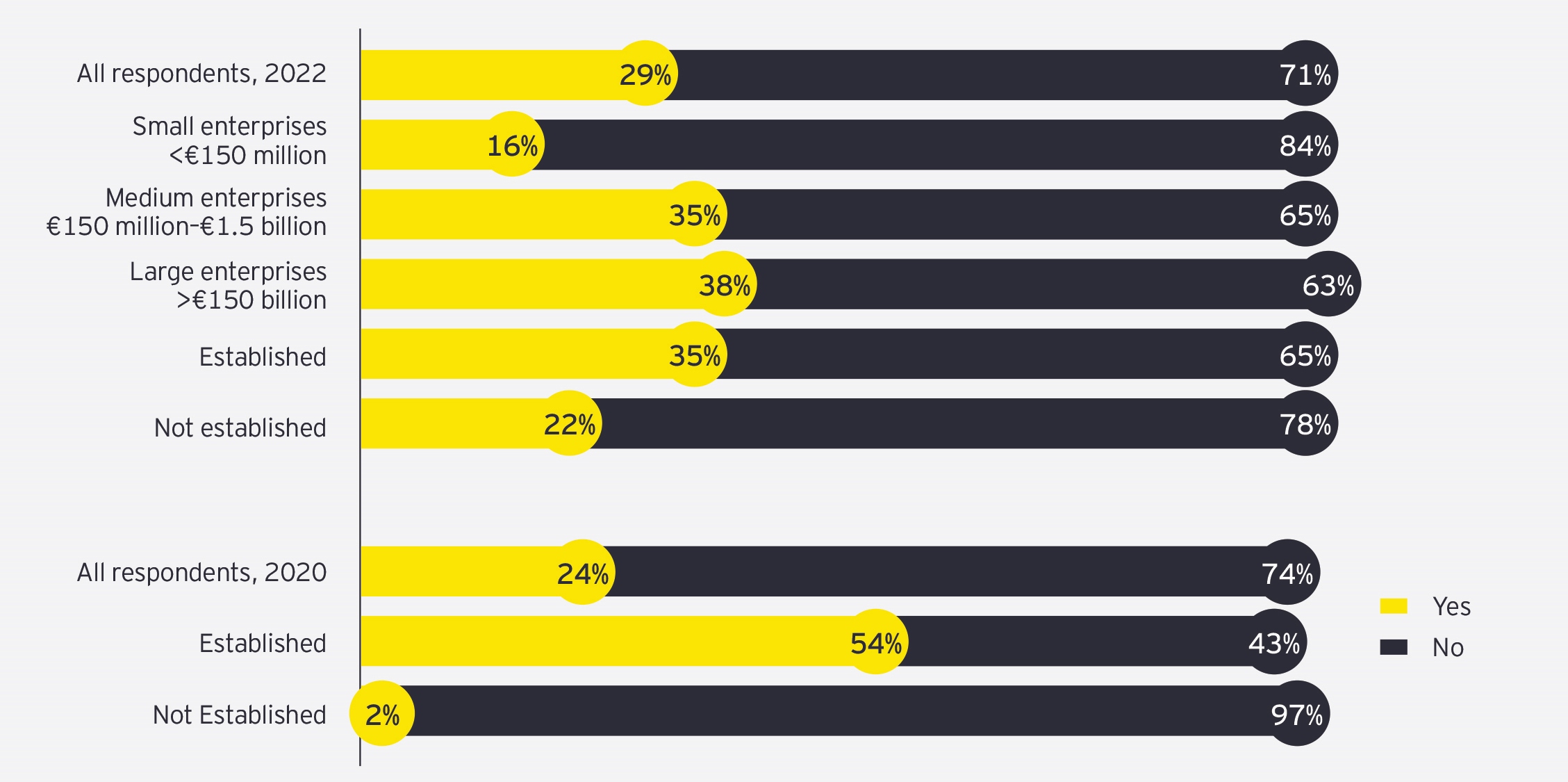
In your view, where should Cyprus concentrate its efforts in order to maintain/improve its competitive position in the global economy?
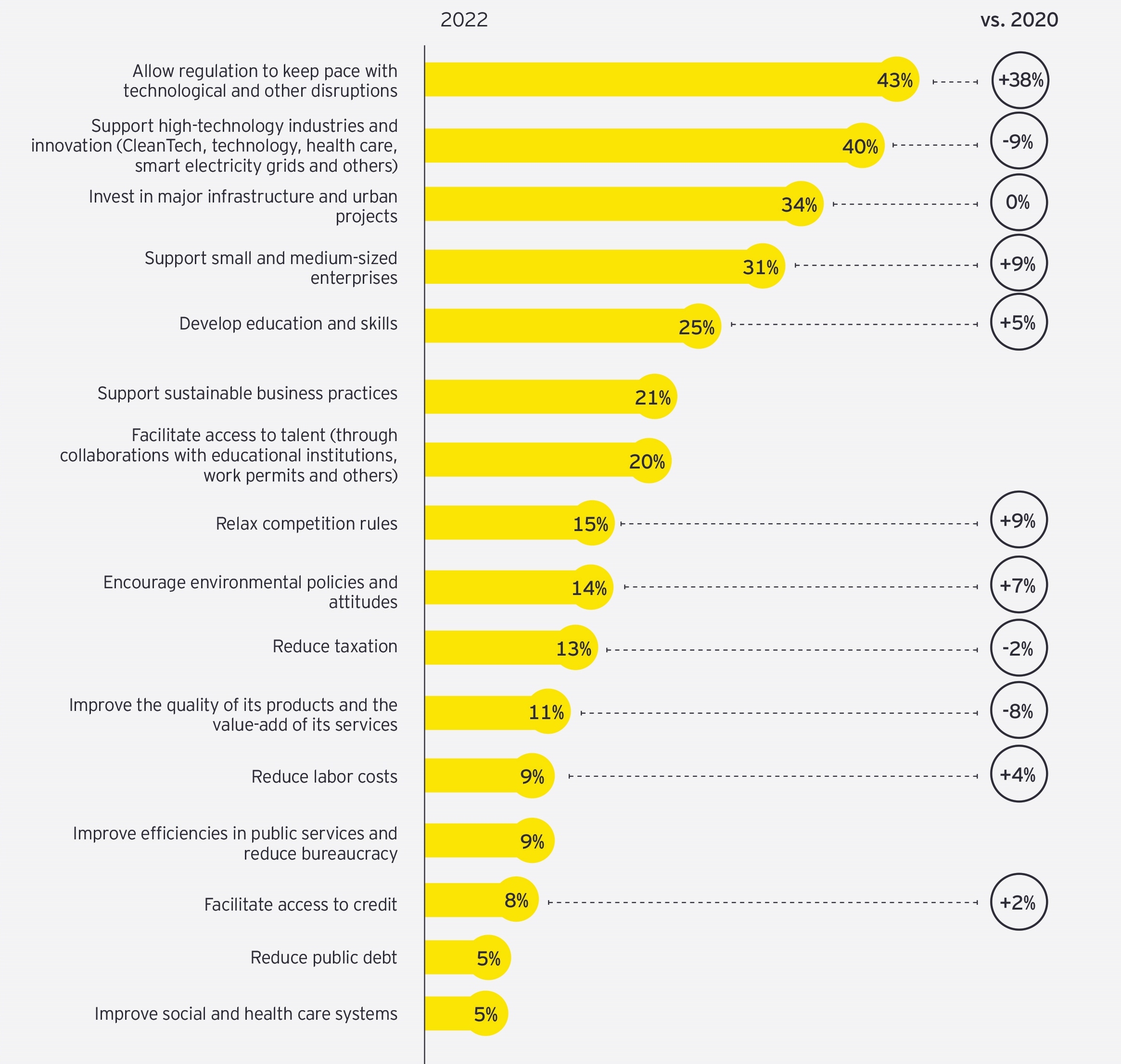
What type of investment project does your company want to establish or expand in Cyprus?
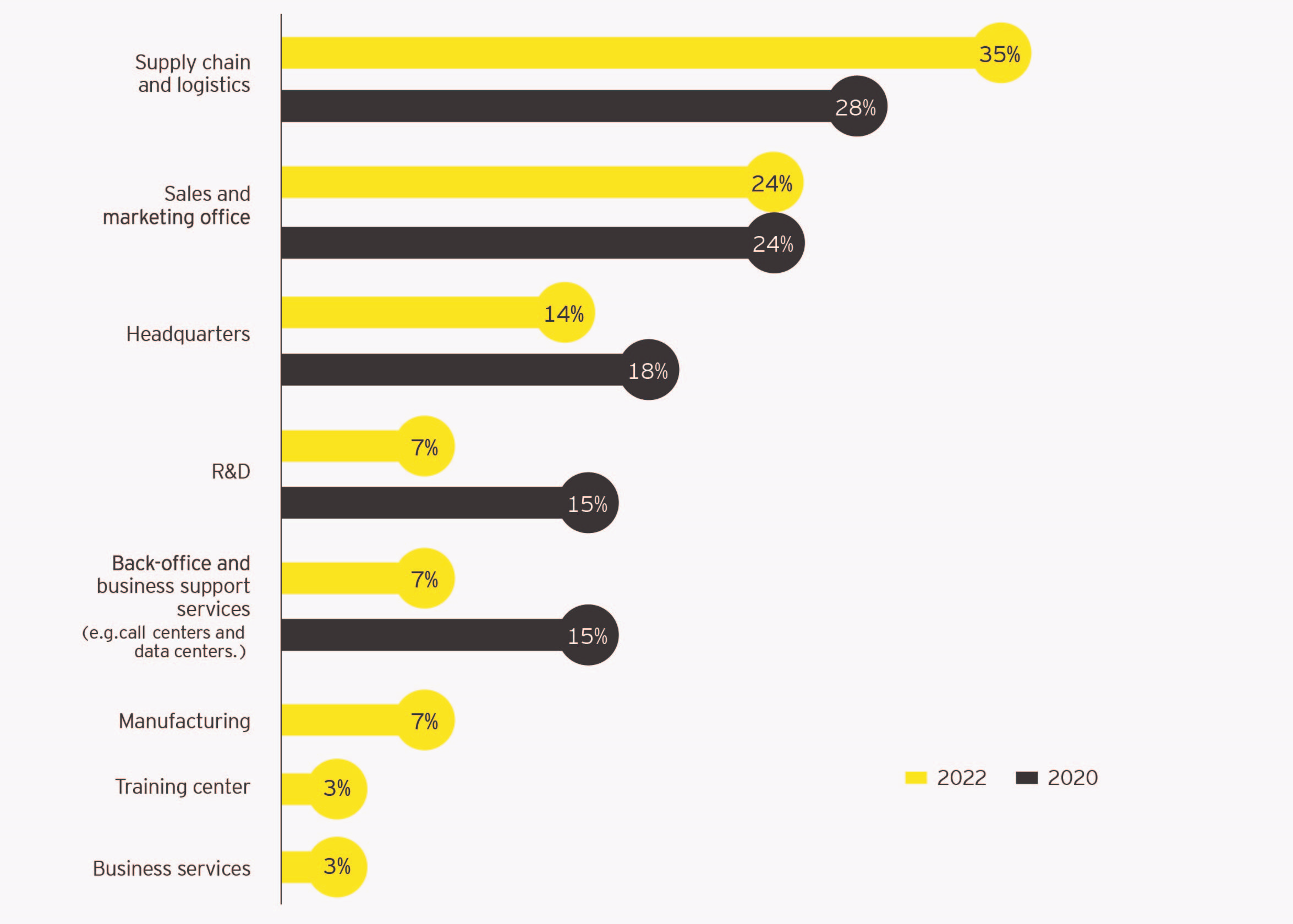
In your opinion, which main business sector will drive Cyprus’ growth in the coming years?
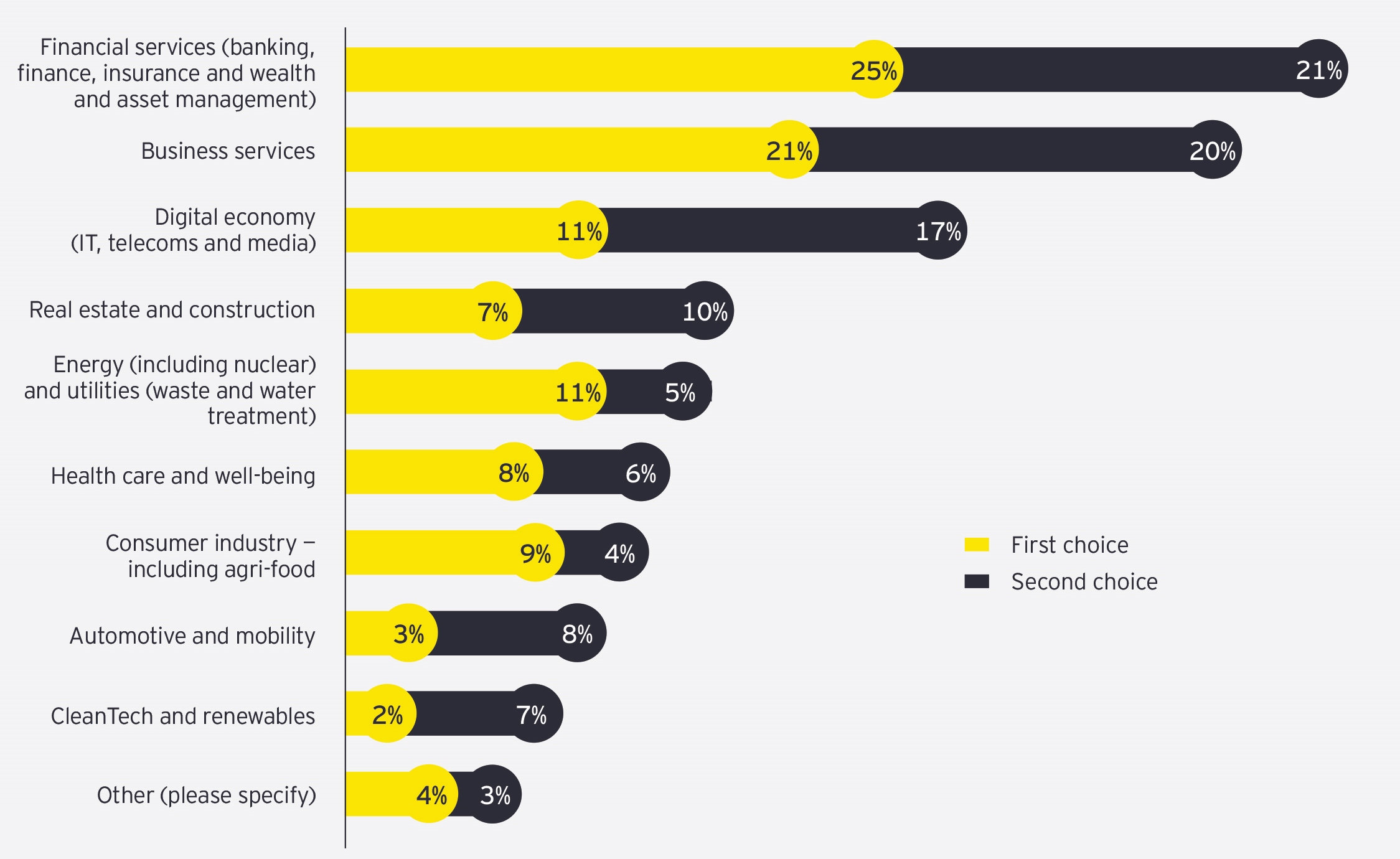
Фонд исследований и инноваций (ИдЕК) объявил, что выделит 10 млн евро инновационным предприятиям в рамках своей программы DISRUPT. Конечная цель программы ― привлечение к финансированию стартапов венчурных инвесторов.
«С целью дальнейшего укрепления инновационного бизнес-сообщества Кипра и, как следствие, экономики страны, Фонд исследований и инноваций объявляет о своей новой флагманской финансовой программе DISRUPT. Ее общий бюджет составляет 10 млн евро», ― говорится в заявлении фонда. Программа финансируется за счет плана восстановления и устойчивости и направлена на то, чтобы связать кипрские инновационные компании с венчурными инвесторами. Это делается для проникновения на существующие и новые рынки. «Цель программы DISRUPT состоит в том, чтобы побудить потенциальных инвесторов внести свой вклад в дальнейшее развитие компаний-участниц и в их экспансию на международные рынки», ― сказано в заявлении фонда.
Программа открыта для малых, средних и крупных предприятий, которые на момент подачи заявления уже имеют минимально жизнеспособный продукт и подписанное соглашение с инвестиционным фондом, которое предусматривает инвестиции в акционерный капитал компании в размере не менее 1 млн евро. Другими словами, финансирование, которое предоставит фонд, будет объединено с финансированием инвестиционных фондов. В конечном счете это будет способствовать успешному проникновению компаний-бенефициаров на зарубежные рынки, укреплению конкурентоспособности и устойчивости кипрской экономики. В фонде отметили, что максимальная сумма финансирования для каждого проекта ограничена 1,5 млн евро.
Заинтересованные лица могут представить свои предложения до 13:00 23 марта 2023 года на сайте фонда. Для получения дополнительной информации заинтересованные лица могут обратиться по телефону 22 205000 или по электронной почте support@research.org.cy
Бесплатный энергоаудит для малого бизнеса
В этой статье Андрей Яранцев и Александр Шиляев делятся советами для начинающих руководителей игровых компаний, рассказывают о том, какие выводы за годы работы были сделаны из их личного опыта, в чем секрет успеха компании Melsoft, которая прочно удерживает место в топ-100 самых успешных мобильных игровых компаний в мире.
Выросли в 200+ раз
В 2015 году мы стартовали мобильный стартап в рамках большой корпорации. С одной стороны хотелось большей свободы принятия решений, как это принято в стартапах, с другой стороны было интересно проверить теорию о компаниях-амбидекстерах, которые одинаково могут быть успешны и в инновациях, и в оперировании устойчивого бизнеса. За несколько лет компания выросла по выручке более чем в 200 раз и была продана израильскому стратегическому инвестору. Мы начинали с 60 человек, выросли до 500, закрепились на мировой арене. Начиная стартап, мы планировали его как антипод корпорации – больше самостоятельности, больше креативности, больше ответственности за результат, но при этом меньше бюрократии и непродуктивного менеджмента. За семь лет развития компании некоторые взгляды на построение бизнеса изменились. Тезисно перечислим их ниже.
Игры нужно делать небольшими командами разработки (“two-pizza” team)
Существует распространенное убеждение, что продукт должна создавать небольшая команда, которую, условно, можно накормить двумя пиццами. В этом смысле, мы придерживались правила, что размер команды в ходе разработки игры должен быть порядка 8–12 человек, а после ее запуска и начала оперирования – не больше 40–50. В таком формате несколько лет существовал и оперировался один из наших ключевых продуктов.
Но в реальности, по-настоящему большие продукты с большой выручкой (например, из топ-50) должны оперироваться намного большими по размеру командами. Устойчивость развития продукта, зависит от выстроенной организации. Мы пришли к тому, что развитие продуктовой команды должно слаженно идти по нескольким ключевым направлениям одновременно (у нас их было выделено шесть).
Ключевыми изменениями в 2020-21 годах для нас стали разделение команд разработки и LiveOps, переход к осознанной имплементации новых фичей через А/Б тестирование, а также выделение команды мониторинга бизнес-метрик и решения проблем, которые мешают нормальному ежеминутному функционированию бизнеса.
В итоге, если ваш продукт разрабатывает 50–100 человек, то скорее всего вам потребуется команда LiveOps сопоставимого, а порой и большего размера. Плюс маркетинг с командой создания креативов. Так что, весьма вероятно, что для успешной мобильной игры вам потребуется собрать команду в 200–300 человек, вместо “two-pizza team”.
Каждая игровая компания обязана регулярно запускать какую-то новую игру
Опять же, существует распространенное убеждение, что каждая игровая компания должна с какой-то периодичностью выпускать абсолютно новые продукты. На практике быстро становится понятно, что поиск нового прорывного продукта крайне непрогнозируемая вещь. Можно пытаться креативить и попасть “в молоко” (не попасть в аудиторию), можно пытаться угнаться за трендами и опоздать, можно копировать чужой продукт и не уловить его суть.
Мы, должно быть, за семь лет попробовали все это, и пришли к выводу — бизнес должен фокусироваться на том, что у него получается лучше всего. Это может быть, скажем, построение топового маркетинга или производство высококлассного контента. Инновации и оптимизации в игровой компании могут быть в любых процессах, не обязательно только в создании новых игр.
В нашем случае компания смогла сфокусироваться и вырастить два продукта, прототипы которых были, по сути, куплены на рынке. Но это вполне классическая бизнес-история – выигрывает не тот, кто придумал, а тот кто смог сделать работающую бизнес-модель.
Кстати говоря, Melsoft был изначально задуман как мульти-продуктовая компания. Мы сознательно избегали матричных систем управления: такие системы считаются оптимальными, но всегда сталкиваются с проблемами внутренних приоритетов, из-за чего один успешный продукт в компании перетягивает все внутренние ресурсы на себя, тем самым “убивая” возможность других продуктов расти.
Менеджмент – это зло, успешная компания может обходиться без менеджеров
Прежняя корпоративная карьера (как и анализ успешных гибких компаний, таких как Supercell и Spotify) убедила нас, что число “чистых” менеджеров в компаниях надо минимизировать. Средний менеджмент – это источник разного рода коммуникационных проблем. Многие годы, даже когда численность персонала в Melsoft перевалила за полторы сотни человек, количество чистых менеджеров в компании можно было пересчитать по пальцам одной руки.
Мы до сих пор уверены, что для стартапов и небольших организаций средний менеджмент не нужен и вся ответственность должна быть полностью в руках специалистов. Но когда бизнес дорастает до состояния too big to fail и цена ошибки становится высока, то профессиональное планирование и коммуникации становятся просто необходимы. В этом момент организации становится нужен профессиональный (ключевое слово!) средний менеджмент.
Объединять “схожие” функции в рамках одного отдела вполне нормальная практика
На определенном этапе развития компании, мы считали вполне допустимым и даже эффективным совмещение различных функций в рамках одного отдела (не только по причине экономии средств). Например, отдел маркетинга оперирует деньгами на рекламу, значит понимает в мотивации пользователей отликаться на рекламу. Почему бы не поручить им акции и распродажи (и там, и там своего рода “продажи”)? Или почему бы разработчикам и серверным программистам не приглядывать за рабочими серверами?
В итоге мы пришли к выводу, что каждый должен делать свою работу с максимальным фокусом и вовлеченностью. Задача маркетинга – приводить новых пользователей. Это работа с внешними партнерами, с определенными инструментами по определенным правилам. Оперирование продукта и ведение существующих клиентов, которые могут играть в нашу игру годами, это совершенно отдельная функция со своими инструментами, правилами, аналитикой.
Кстати, функция оперирования нередко имеет в компаниях более низкий приоритет нежели маркетинг и разработка, хотя именно в оперировании и настройке продукта под разные сегменты аудитории находится ключ к максимизации монетизации продукта.
Какими качествами должна обладать управленческая команда?
Есть расхожее изречение “Культура ест стратегию на завтрак”. Культура и взаимодействие управленческой команды задает паттерны поведения всей компании. Профессионализм отдельных менеджеров несомненно важен, но для общей слаженной работы важны, как нам кажется, следующие качества:
● Забота о сотрудниках.
● Отсутствие зацикленности на себе и своем статусе (здоровые амбиции, спокойное отношение к названию должности и линиям отчетности).
● Конструктивное исполнение нужных для компании решений (даже при каком-то несогласии с ними).
● Взаимоподдержка и взаимовыручка.
● Способность самостоятельно или в рамках своей команды психологически и эмоционально восстанавливаться (не перенося свои проблемы на коллег).
В 2020 и 2022 годах мы неоднократно убеждались, что стратегия компании может измениться за один день, и каждый раз наша управленческая команда собиралась и оперативно решала задачи анализа рисков, обновления планов и пересборки компании.
Как правильно выстроить систему финансовой мотивации сотрудников?
Несколько лет в нашей компании функционировала система разделения прибыли (profit sharing). Ежегодно в конце года мы подсчитывали итоговый финансовый результат и по формулам в таблице делили часть прибыли со всеми сотрудниками. В стабильном бизнесе это вполне рабочая система, но у нее есть свои проблемы. Во-первых, люди привыкают к годовой премии как к неотъемлемой части их дохода. Поэтому если в один год прибыль оказалась ниже, чем годом ранее, то это ведет скорее к разочарованию (деньги хорошие, но есть недовольство). Во-вторых, заранее запланированная премия в целом не приводит к росту мотивации – размер премии можно прикинуть уже заранее и морально подготовиться. В-третьих, когда компании нужно расти и вкладывать всю прибыль в рост, то такая система просто вредна и не работает.
На практике, хорошо срабатывают неожиданные события: звонок посреди дня о поднятии зарплаты на 30% по инициативе компании, раздача качественного и дорогого мерча, дорогие подарки по значимым для компании случаям (новые телефоны, игровые приставки итд). Неожиданные вещи откладываются в памяти и ценятся намного выше.
Таким образом, финансовая мотивация сотрудников должна включать в себя прозрачную часть (зарплата и бонус, например, привязанный к достижению определенных целей) и случайную, получаемую неожиданно (по решению руководства компании).
Кипр стабильно увеличивает потребление энергии из возобновляемых источников. Однако по этому показателю республика все еще незначительно отстает от среднего уровня Евросоюза.
«Евростат» обнародовал рейтинг стран Евросоюза по потреблению энергии из возобновляемых источников в 2022 году, в том числе позицию Кипра. В исследовании также приведены данные по ВИЭ в государствах-лидерах.
Средняя доля потребления возобновляемой энергии в ЕС составила 21,8% в 2021 году. Впервые было зарегистрировано незначительное снижение – на 0,3 процентных пункта. Это может объясняться резким ростом потребления после отмены мер по борьбе с COVID-19. Вторая возможная причина – изменение методологии расчета данных.
В абсолютных цифрах производство энергии из возобновляемых источников увеличилось по сравнению с 2020 годом.
На Кипре этот сегмент энергетики стабильно растет с момента вступления страны в ЕС в 2004 году. Но остается ниже среднего показателя в ЕС.
– В 2019 году доля составляла 13,8%.
– В 2020 году – 16,9%.
– В 2021 году – 18,4%.
Рейтинг стран по использованию ВИЭ
Швеция остается страной с самым высоким процентом потребления энергии из возобновляемых источников среди государств Евросоюза – 62,6%. Генерация происходит главным образом на основе биомассы, гидроэнергетики, ветряной энергии, тепловых насосов и жидкого биотоплива.
За Швецией следуют Финляндия (43,1%) и Латвия (42,1%). Эти государства в основном используют биомассу и гидроэнергетику.
В списке лидеров также Эстония: 37,6% – биомасса и ветряная энергия. Австрия набирает 36,4% на основе биомассы и гидроэнергетики. Дания генерирует 34,7% из биомассы и энергии ветра.
Показатели ниже среднего по Евросоюзу – у 15 стран. Это Кипр, а также Бельгия, Болгария, Франция, Германия, Ирландия, Испания, Италия, Нидерланды, Люксембург, Мальта, Венгрия, Польша, Словакия и Чехия.
Самые низкие показатели потребления энергии из возобновляемых источников зафиксированы в Люксембурге (11,7%), на Мальте (12,2%), в Нидерландах (12,3%), Ирландии (12,5%) и Бельгии (13%).
Перспективы ВИЭ
Согласно актуальной директиве ЕС, доля энергии из возобновляемых источников должна достичь 32% к 2030 году. В предложении на 2021 год Еврокомиссия увеличила этот показатель до 40%. А в 2022 году в рамках проекта REPowerEU появился новый целевой показатель – 45%.
Читайте также:
Кипр увеличил долю ВИЭ на 5,2%
Total построит на Кипре фотоэлектрический парк
Yannis Matsis, head of the Cyprus office for MUFG Investor Services, the global asset servicing arm of Mitsubishi UFJ Financial Group, speaks to the Successful Business Magazine about how the company represents all the best one can find in both the Anglo-Saxon and Japanese business cultures and what Cyprus needs to do to attract big investment funds, international fund managers and administrators to the island.
Parent company of MUFG Investor Services is Japanese, the business you conduct is international, and your office in Cyprus will serviceyour existing client base globally. Is that not a lot to juggle on the business/ cultural front?
Yes and no. The way we deliver our services is Anglo-Saxon in that we are very open and flexible. As an employer, we are very modern, all-inclusive, with full transparency and very little hierarchy. But how we focus on our long-term goals and on ensuring zero error rates in what we do for our clients is very Japanese. Our approach – treating our clients as our trusted partners – is very much Japanese-driven...
It is very interesting that a Japanese company that clearly thinks long term, low risk and has a conservative business approach would choose Cyprus as its base. It may mean that Cyprus is competitive compared to other EU business destinations. How was the choice made?
We are one of the largest fund administrators globally and our clients include the biggest investment managers in the world. Our business is a 24/7 model. We follow the sun, our aim is to address and satisfy customer needs without regard to geographic location or time zone.
So when the company decided to establish a new office in this particular time zone, our parent company set out to find what they considered to be the best and most suitable country in Europe. Cyprus proved to be the best option and was chosen for a variety of reasons. Of course, the fact that Cyprus is in the EU was important but so too were many other countries that we considered. Cyprus offered other advantages: the fact that almost everybody speaks English here, which isn’t the case in many other European states; the fact that in addition to EU laws and regulations that apply here, common law like in the UK also applies because of the island’s past. Then there is the location – not just in Europe and a part of the EU but close to the Middle East! Also, there is the quality of life. Last but perhaps the most important to us, is the quality of localtalent that can be accessible to us as an employer. We always look for the best quality centres where we can hire well, train well and be in a position to ensure and offer our clients the best quality service. Our choice of Cyprus proved this to be the case.
We have been receiving very high quality CVs, and we have been impressed by the exceptional quality of professionals that we have hired here, in Cyprus, so much so that we decided to expand our initial plans to employ around 100professionals, and instead to grow the Cyprus office up to 300 professionals over the next few years.
What countries are Cyprus’ main competitors when companies set out to choose a place for their offices?
Every European country is a potential competitor but frankly Cyprus ticks off more boxes than the others. Of course, you never find a perfect place, but you aim to find a place that best satisfies most of your requirements. Cyprus is very strong in this. Our biggest disadvantage is the air connectivity.
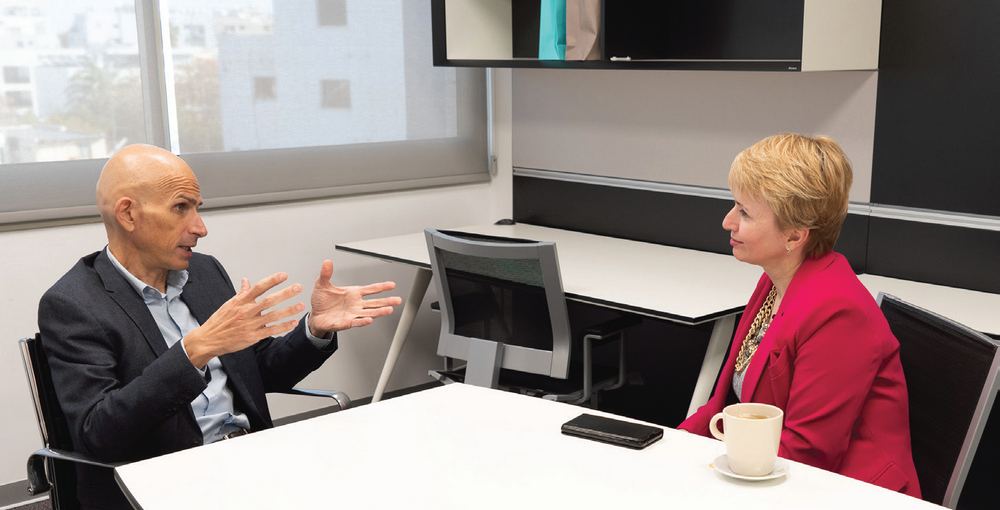
What about reputation?
Reputation of the island, due to bad practices of the past is indeed an issue and poses a disadvantage to Cyprus as a business destination. Back in the 2000-2013 period, Cypriot banks had low standards and the compliance level was not very high. However, since then the island has fully and comprehensively addressed these issues.
If you were to name the most important steps Cyprus should take in the immediate future to change and improve, what would they be?
Cyprus doesn’t have much to do – we have mostly done it. What Cyprus needs is more marketing and exposure. We now have international best standards on areas of compliance. We just have to go out there and communicate it, making sure we avoid scandals while going forward. The reality is that we fixed it. Now, it is about how we market it.
When I was Chairman of the Association of Cyprus Banks, together with the deputy CEO of the Bank of Cyprus and the CEO of the Cyprus Development Bank (CDB), I visited the United States Congress and Senate to explain our compliance standards and policies because Washington had been applying pressure on us to improve them. We sat with various Committees of the Senate and the Congress, including the Finance Committee and the Armed
Forces Committee – the latter may appear strange to the layman, but it does demonstrate the importance that the United States is placing on issues of Anti-Money Laundering and Countering the Financing of Terrorism. So we went item by item through our policies, through all that we had changed, and we convinced them. In fact, the Finance Committee stated that our standards were stricter than theirs.
So what we need is marketing. We need to go out there, see the important stakeholders, talk, meet the press, convince through communicating our tangible actions, project the positive image that I believe we developed, and most importantly walk the talk. In other words, we must continue to show that we are serious about what we do, avoid scandals and keep on maintaining and implementing the highest standards. The reality is that reputation takes years to build and a day to destroy.
So what improvements have there been? Are we doing better than 10 months ago, than two years ago?
Two years ago we had just one corresponding bank. All the banks in Cyprus – the Bank of Cyprus, Hellenic Bank, all the smaller banks – had only one corresponding bank,this being Citibank. Had the day come and this one corresponding bank decided to leave, the whole island would have been left frozen… But we did all the corrective work and today the biggest Banks have more correspondents, such as the Bank of New York (BoNY) and JP Morgan also – a huge sign of improvement.
As you noted, there are two sides to every coin. The reverse side of improving all these banking procedures is that our banks have now become very difficult to work with…
I agree. There is a problem and it arises because of two issues. The first is that the pace of change to raise the compliance level was huge so staff in the banks had to struggle in order to keep up in terms of training and understanding the new policies and procedures. Secondly, systems lagged behind because introducing new systems in banking is notoriousy difficult. So our policies are strong and reflect international standards but implementation of these policies still requires hard work and that implementation comes down to new technology and staff training. However, the Banks fully recognise that, and, driven by the Central Bank, are working hard to get there.
What do you think the immediate future holds for Cyprus? What changes, challenges, problems or benefits do you expect in 2023?
It is certain that the Cyprus economy will grow stronger than in Europe. We keep on attracting foreign companies and this brings revenue from abroad to the island. This is the best form of revenue, the best quality business for the country. Remember that this revenue is spent by the foreign companies that establish base here to pay salaries and rent, and is consumed locally, in sectors such as schools, supermarkets, food and entertainment, real estate, the auto industry, etc.
What I am mostly concerned about currently – and this is a global and not just a Cyprus phenomenon – is inflation. This has been caused by a number of factors, including excessive liquidity, the suupply-chain constraints due to the pandemic and the war in Ukraine. Its current level, both in the Euro-area and the US is very worrying and with the end of the war not in sight, there are no signs as to when it will abade.
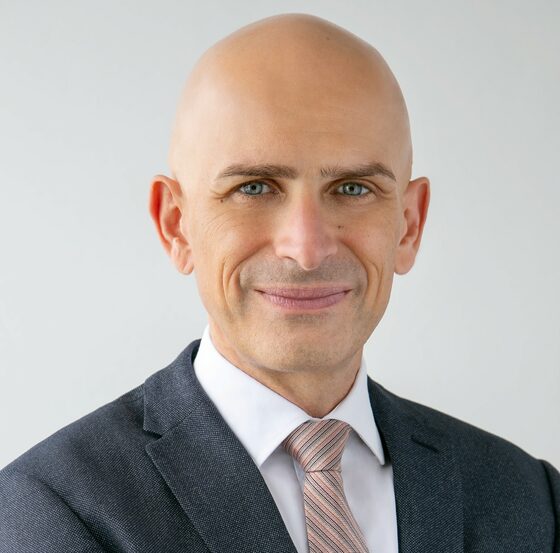 Yannis Matsis
Yannis Matsis
Managing Director, Head of Cyprus, MUFG Investor Services
Yannis heads the new MUFG Investor Services office in Cyprus, expected to grow to 300 staff over the coming 4-5 years. Yannis has 30 years of professional experience, having served as CEO of Hellenic Bank, as Global Head of Credit, Interest Rate and Foreign Exchange Derivatives at Mizuho in London, and as Global Head of Credit Derivatives at ING Barings in London. He also co-founded Point Nine, a Financial Technology company, recently acquired by MUFG. Yannis currently serves as Chairperson of the Boards of the Cyprus Institute of Neurology and Genetics and of Point Nine Data Trust. He previously served as Chairperson of the Boards of the Association of Cyprus Banks, as Chairperson of Artemis Bank Information Systems, a private Credit Bureau, and as a Member of the Boards of Hellenic Bank and of the European Banking Federation in Frankfurt.
![]()
MUFG Investor Services is a leading asset servicing provider for the global investment management industry, operating from 16 locations worldwide. With over $770 billion in assets under administration, MUFG Investor Services is a top fund administrator globally. It is a core business of Mitsubishi UFJ Financial Group (“MUFG”), one of the largest banks with more than US$3.3 trillion in assets.
Natalia Kardash and Panis Pieri invite their personal networks to meet each other in 2023. The first BMT event is planned for mid-February in Limassol, followed by Nicosia in March, Paphos in April and Larnaca in May 2023.
MAXIMUM 100 PEOPLE
Each event will be attended by 30-50 business leaders from tech industry invited by Panis and 30-50 leaders of non-tech companies invited by Natalia.
PROGRAM AT A GLANCE
• 16.00-16.30 – one-to-one meetings and networking
• 16.30-17.00 – first «roundtable» discussions (maximum 10 delegates per group)
• 17.00 – 17.30: one-to-one meetings and networking
• 17.30 – 18.00: second «roundtable» discussions
• 18.00 – 20.00: cocktail reception and networking
FOUR HOURS TOGETHER
The event is to begin at 16.00. In the first half hour participants may conduct prearranged one-to-one meetings or simply walk around meeting other participants. There will be a moderated discussion in each group that will start by a two-minutes introduction from each participant, followed by a «round-table» discussion on a specific theme which is of interest to this group. The moderator’s role is to ensure everyone has had the opportunity to introduce themselves and their business, contribute to the discussions and keep to the 30-minute timeline per meeting.
Delegates will have the opportunity to network between the “roundtable” meetings scheduled for that afternoon and attend the pre-registered one-to-one meetings.
From 17.30 to 18.00 attendees will participate in a discussion with a different group — around 10-15 minutes for group participants’ introductions, this time to a different audience, and 15-20 minutes for an exchange of ideas, thoughts and information.
At 18:00, participants will be invited to attend a reception to enjoy a glass of wine, whilst having the opportunity to keep networking.
HOW DOES THE NETWORKING WORK?
At this networking event people can meet and create many new contacts. Group meetings take 30 minutes, which allows enough time to establish connections. Then the bell rings to finish group meetings and after some time the next round of meetings starts. When participating in two groups, each person hears introductions of 14-16 people and can discuss with them relevant subjects during the group talk and later in the event.
Upon the registration, few weeks before meetings, participants provide their photo and business profile. A few days before the event, each participant will receive a meeting schedule, showing names, time and location of the personal meetings, and also enough information on anyone they can meet in groups or during the cocktail time during this event.
WHAT ARE THE BENEFITS OF PARTICIPATING IN THIS NETWORKING EVENT?
1. Meet many new contacts of C-level at once.
2. Have enough time to speak to most of them.
3. Introduce your business, your ideas and plans to like-minded people.
All participants can present their expertise, company profile and future business plans prior to the event, online. This way, registered delegates can start networking prior to the BMT event and be more targeted with their networking at the event.
PARTICIPANTS
Only business owners and C-level executives can register for this event. The organisers will keep a 50/50 balance: half of participants work in IT and technology sector and the other half not. Organisers know all the participants in person and can help in networking.
DATES 2023 AND REGISTRATION
Limassol – February
Nicosia – March
Paphos – April
Larnaca – May
The participation fee is €50 per event and if you wish to participate in one or more of these events, please send an email including your information and company profile to vk@vkcyprus.com.
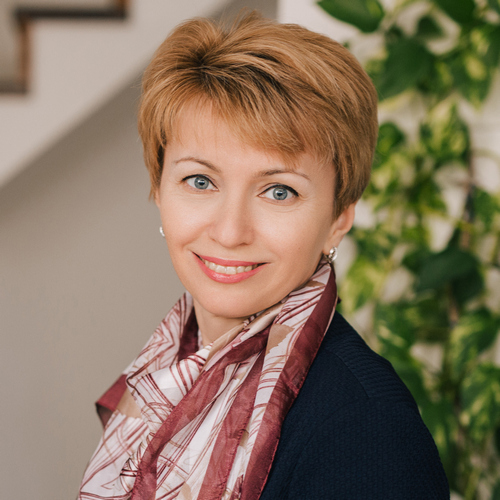 Natalia Kardash
Natalia Kardash
Main areas of expertise: publishing, communications, business introductions and networking. Publisher, Editor-in-chief, VESTNIK KIPRA Newspaper and SUCCESSFUL BUSINESS Magazine; Founder, SUCCESSFUL BUSINESS Leaders’ Club; Founder, Chairwoman, BEST LEGAL Conference, BEST INVEST Congress, HEALTH&BEAUTY Forum. Natalia’s personal network exceeds 6000 members, from leaders within government; corporate and private enterprises and foreign business executives who reside in Cyprus or live abroad and have interests in Cyprus.
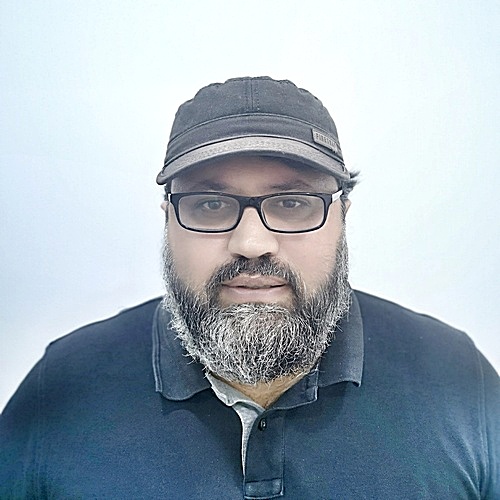 Panis Pieri
Panis Pieri
Startup and Tech Journalist; Founder of Startups364; Startup & Innovation Editor, Cyprus Mail; Host and Producer of the podcast “Live with Panis”. Organiser of EcoX Cyprus Networking Meetups. Panis is also involved in different non-profit initiatives around the world as a startup mentor or startup judge. Furthermore, he regularly contributes content material relating to start-ups and tech innovation, to major publications globally
bmtcyprus.com | #BMTCyprus
Сдержанный рост мировой экономики, высокая инфляция, энергетические проблемы… Прогноз на 2023 год нельзя назвать оптимистичным. Однако у Кипра неплохие перспективы.
В 2022 году мировая экономика демонстрировала сдержанный рост, сопровождавшийся сильным инфляционным давлением и проблемами с энергетической безопасностью. Директор-распорядитель Международного валютного фонда Кристалина Георгиева уже выступила с предупреждением, что 2023 год будет еще более сложным. Различные прогнозы указывают на незначительный рост экономики в США (и это — в качестве наилучшего сценария), рецессию в ЕС и неблагоприятные события для мощных экономик типа китайской.
Основными факторами станут устойчиво высокая инфляция, дальнейшее ожидаемое повышение процентных ставок центральными банками в их стремлении вернуть инфляцию к целевому уровню, продолжающийся энергетический кризис, усугубляемый попытками Европы снизить или даже устранить свою зависимость от российского импорта. Каково место Кипра в этом водовороте мировых экономических событий?
Перспективы и опасения Кипра
Эксперты, опрошенные изданием Cyprus Mail, считают, что у страны, несмотря на глобальные трудности, очень хорошие перспективы в наступившем году. Экономист, бывший генеральный директор Министерства финансов Андреас Хараламбус и управляющий директор отдела инвестиций компании PwC Омирос Писсаридис уверены: на Кипре положительные показатели туристического сектора и высокие темпы открытия иностранных компаний, главным образом в IT-секторе, привели к лучшим экономическим результатам, чем первоначально прогнозировалось. Ожидается, что те же факторы продолжат позитивно влиять на развитие событий в течение 2023 года, хотя степень неопределенности остается высокой.Однако, удовлетворительные показатели экономики маскируют серьезные структурные недостатки, с которыми сталкивается страна. Следовательно, параллельно с устранением краткосрочных последствий нынешнего кризиса нужно не упускать из виду и долгосрочные проблемы.
К сожалению, Кипр продолжает отставать в важнейших секторах, таких как энергосбережение, продвижение возобновляемых источников энергии и цифровая экономика. Кроме того, страна зависит от секторов, для которых характерна нестабильность – например, от строительного сектора, который вредит окружающей среде и испытывает проблемы с долгосрочной устойчивостью. Наконец, Кипру необходимо решить серьезную проблему нехватки рабочей силы путем переориентации своей системы образования в соответствии с потребностями рынка. Для этой же цели необходима всеобъемлющая иммиграционная политика, направленная на привлечение высококвалифицированного персонала.
Мировая экономика крепче, чем кажется
В мировом масштабе некоторые факторы свидетельствуют о том, что экономика может работать лучше, чем ожидалось.
Во-первых, недавняя тенденция к снижению инфляции в сочетании с умеренным повышением заработной платы, как ожидается, позволит центральным банкам занять менее агрессивную позицию по процентным ставкам. Большинство аналитиков прогнозируют, что повышение процентных ставок в еврозоне достигнет максимума примерно в 3% к середине 2023 года, и такое развитие событий обеспечит достаточный приток кредитов в экономику.
Во-вторых, успех в области энергосбережения привел к резкому снижению спроса и, следовательно, цен на нефть и природный газ. Негативные последствия энергетического кризиса для производства были менее выраженными, чем первоначально предполагалось. В частности, в период с августа по ноябрь 2022 года ЕС потребил на 20% меньше природного газа, что позволило увеличить объемы хранения на 13,4% по сравнению со средним показателем января в предыдущие годы. Поэтому, несмотря на сохраняющуюся неопределенность из-за событий на Украине, роста цен на энергоносители не ожидается.
В-третьих, удовлетворительный уровень занятости и повышение заработной платы (хотя и умеренное, ниже уровня инфляции) поддержали и поддержат потребительский спрос.
Прогноз: экономика Кипра в 2023 году
MAP S.Platis is a leading Financial Services Consulting Group with clients that include regulators, banks, funds and fund managers, investment firms, financial technology firms, insurance firms, payment and electronic money institutions. The group’s expert team provides tailored solutions in international licensing, regulatory compliance, risk management, internal audit, HR, regulatory technology, information technology, business resilience, information security including cybersecurity, governance, executive training and innovation consulting to financial institutions in the UK, Cyprus, and the EU.
KEY FACTS AND FIGURES
• 300+ successful license applications
• 100% success in license applications
• 1000+ clients of global activities in the regulated financial services industry
• 20 years of experience
SERVICES:
Financial Advisory: International Licensing, Regulatory Compliance Consulting, Internal Audit, Financial Forensics.
Risk Management: MAP Risk Management Services specialises in the provision of Risk Management and Capital Adequacy services in the financial services industry.
Regulatory Technology: MAP FinTech is an award winning global regulatory technology provider for the financial services industry specialising in regulatory reporting solutions across several complex and challenging EU Directives and international regulations.
Professional Training: The European Institute of Management and Finance (EIMF), is leading provider of premium training, professional and executive education, eLearning and tailored learning solutions with a strong emphasis on the financial and professional services sector. New Horizons, a member of the world’s largest independent IT training provider, offers a wide range of courses preparing IT professionals and corporate teams in Cyprus to acquire certifications in leading technologies.
HR Consulting, Recruitment and Temporary Placements: MGR Human Resources (MGR) is a broad HR Consulting practice, Training Centre, licensed Recruitment Agency and licensed Temporary Placements Agency, with offices in Cyprus and Malta.
Information Security & Business Resilience: Quadprime is a consulting agency which provides Information Security including Cybersecurity and Business Resilience services.
Fund Management: MAP Fund Management Services is an Alternative Investment Fund Manager (AIFM), authorised and regulated by the Cyprus Securities and Exchange Commission (CySEC).
 Limassol: 82 Archiepiskopou Makariou C, Amaranton Court, 1st Floor, Mesa Geitonia, 4003 Limassol.
Limassol: 82 Archiepiskopou Makariou C, Amaranton Court, 1st Floor, Mesa Geitonia, 4003 Limassol.
Tel: +357 2535 1335 Fax: +357 2535 1330
Nicosia: 2 Diagorou, ERA House, Floors 9-12,1097 Nicosia.
Tel: +357 2287 7744
Website: www.mapsplatis.com
E-mail: info@mapsplatis.com
Photo: MAP S.Platis Group
Advertisement
Управляющий Центральным банком Кипра Константинос Иродоту подчеркнул необходимость сохранения бюджетных возможностей для обеспечения зеленого перехода, развития цифровизации и финансирования социальных программ.
Выступая на мероприятии «Глобальная долговая ловушка: последствия для экономического роста и пути выхода из нее», глава кипрского ЦБ охарактеризовал долговую динамику страны за последние 10 лет.
Государственный долг
Наблюдается общая тенденция к снижению госдолга после экономического кризиса 2012-2013 годов, за исключением его роста в 2018 году в связи с ситуацией вокруг Кооперативного банка и в 2020 году из-за пандемии COVID-19. Соотношение госдолга к ВВП в 2022 году опустилось ниже уровня 90% благодаря возобновлению экономической активности и последовавшему за ним экономическому подъему.
В настоящее время риски остаются высокими. На это влияют события на Украине и ухудшение глобальной экономической конъюнктуры.
«На нынешнем этапе решающее значение имеет сохранение фискального пространства. Вмешательство правительства важно для поддержки цифровизации и зеленого перехода. Государственное содействие повышает конкурентоспособность и способствует социальной сплоченности», – заявил Иродоту. По его словам, поддержать эти цели могут средства, выделяемые по Плану восстановления и устойчивости. Благодаря успешному проведению структурных реформ, зеленой повестке и цифровизации экономика станет более устойчивой.
Частный долг
Выдача кредитов после 2013 года регулируется более строго. По данным Центробанка Кипра, доля дефолтов по новым ссудам остается довольно низкой. Однако уровень частного долга обременен старыми кредитами.
По словам главы ЦБ, внутренний частный долг в республике остается высоким по сравнению со средним показателем по еврозоне в 140%. Снижение до 236% во втором квартале 2022 года по сравнению с пиком в 353% в первом квартале 2015 года в основном обусловлено увеличением номинального ВВП. И вполне вероятен рост частного долга в условиях высокой инфляции, высоких процентных ставок и ослабления перспектив роста. Лимит Европейской комиссии составляет 115%.
«Сравнительно большой частный долг Кипра в сочетании со значительной долей кредитов с плавающей процентной ставкой делает эти займы особенно уязвимыми в наступающую эпоху высоких процентных ставок», – отметил Иродоту.
Выводы ЦБ
Необходимо сохранить фискальное пространство для снижения рисков ухудшения состояния активов и повышения уровня частного долга. Глава ЦБ призвал к большей бдительности на всех уровнях.
Читайте также: